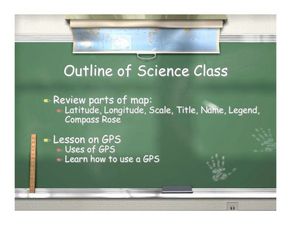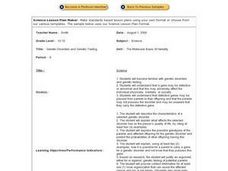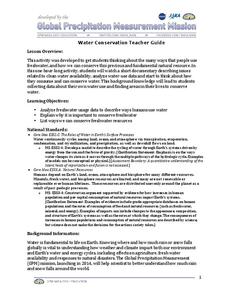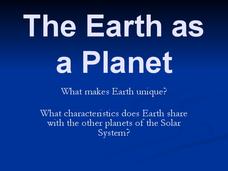Curated OER
The Global Precipitation Measurement Mission (GPM) Lesson
Introduce your class to one of the ways that technology is benefiting humanity. The Global Precipitation Measurement Mission involves the data collected by nine satellites from different countries with a united focus on studying world...
Curated OER
Peek at the Chesapeake!
Students research organisms that live in the Chesapeake Bay ecosystem. In this science instructional activity, students choose an organism and research how it is affected by humans. Students create a presentation of their findings.
NOAA
Stressed Out!
Are our oceans really suffering due to the choices humans make? The sixth and final installment in the volume of activities challenges research groups to tackle one of six major topics that impact ocean health. After getting to the...
ARKive
Biodiversity and Evolution – Darwin’s Finches
Teens experience natural selection firsthand (or first beak) in an activity that has them act as finches foraging for food. Using different household items to act as different beak styles, your little finches will collect as much food...
Curated OER
Nuclear Reactions - Rutherford's Alpha Scattering Experiment
Neat! Show your physics class exactly how Ernest Rutherford fired alpha particles at a piece of gold foil and so determined that most of an atom is composed of empty space. Not just a slide show, but almost an animation, this...
Curated OER
Fuel Cell
Brief, but beneficial, this little gem displays the workings of a hydrogen fuel cell. A simple black-line diagram has question marks at the input and the output, as well as in the middle of the cell. Click on each question mark to reveal...
Curated OER
Lesson on GPS
Students investigate global positioning systems. In this technology and mapping lesson plan, students view a PowerPoint presentation in which they identify the features of a GPS, state its uses, and follow steps to find a waypoint.
Carnegie Mellon University
Hydroelectricity
Use a simple PowerPoint presentation to introduce you environmental studies class to hydropower. Hold a debate about the pros and cons of developing this form of alternative energy. Power up your class with this simple lesson on a topic...
Curated OER
Seeds - How Do Seeds Travel?
Here is a basic presentation on the most common ways that seeds are dispersed through the environment. Flying, popping, sticking, and carry and bury are the methods described in this five-slide PowerPoint. Use this as a complement to a...
NOAA
Invertebrates
Crabs and lobsters ... yum! The 18th installment of a 23-part NOAA Enrichment in Marine sciences and Oceanography (NEMO) program focuses on invertebrate marine life. After the lecture slideshow, learners conduct an activity to sample...
Curated OER
Genetic Disorder and Genetic Testing
Sixth graders explore the characteristics of a selected genetic disorder and research relevant information to justify an argument either for or against genetic testing. Your class can work in groups to gather specific information in...
Curated OER
Water Conservation
Open learners' eyes to the challenge of finding safe drinking water – something we often take for granted in our country. The PowerPoint presentation includes images, graphs, diagrams, and even a video to stimulate discussion on how we...
Discovery Education
Jets in Flight
This Discovery Education activity provides the information needed to understand the basics of flight. Before taking off, young pilots learn the eight stages of the engineering design process. Small groups then design and build an...
NOAA
Tracking a Drifter
Be shore to use this drifter resource. The third installment of a five-part series has learners using the NOAA's Adopt-a-Drifter website to track to movement of a drifter (buoy) in the ocean. Graphing the collected data on a map allows...
Polar Trec
Nature's Density Column
Nature provides density columns in the polar regions that provides food for many animals. Young scientists build their own density columns with water in order to answer analysis questions. Through a slideshow presentation, scholars...
Purdue University
Exploring Whirligigs
What's that silly thing spinning in the wind? It's a whirligig! Explore wonderful windy whirligigs with a STEM-based unit that teaches the science and concepts behind these gigs. Scholars discover how gravity and air resistance...
Bowels Physics
Light, Reflection, and Mirrors
Explore the connection of light, reflection, and mirrors. A comprehensive lesson introduces the basics of light in relation to reflection and mirrors. After an explanation of the vocabulary, the presentation shows how to create ray...
Beyond Benign
Orb-It
How do the products you use rate on a greeness scale? Scholars use a tool to analyze shampoos and cars for their sustainability. They consider factors that affect the environment, the economy, and equity. This is the ninth lesson plan in...
Glynn County School System
The Earth as a Planet
What does our planet have in common with other planets? What makes it unique? Find out in a PowerPoint presentation highlighting many earthly facts! The lesson describes Earth's atmosphere in detail and adds many other important facts...
University of Wisconsin
Getting the Word Out
An appropriate way to celebrate and conclude the construction of a rain garden is to share it with the community. Small groups collaborate to design an outreach product such as a PowerPoint presentation, brochure, or poster, to draw...
Glynn County School System
Cosmology
The past, the present, and the future ... there's so much to discover about the galaxy. Scholars learn about the creation of the universe, its current structure, and how it is changing. The PowerPoint presentation begins with a...
Glynn County School System
Multi-Wavelength Astronomy
Take a look at astronomy through the light lens. From radio to gamma, light waves exist in every corner of the universe. An enlightening PowerPoint presentation gives an overview of the different categories of light and then discusses...
Biology Junction
Phylum Porifera – The Sponges
They may not look like it, but sponges are living, breathing creatures! A PowerPoint presentation explains the important characteristics of the invertebrate Phylum Porifera, or more commonly known as the sponges. From their body...
Curated OER
Lesson 14: Genetic Disorders
Learners create PowerPoint presentation on the topic they researched. In this biology lesson, students fill out a storyboard about their topic. They share their project in class.

























